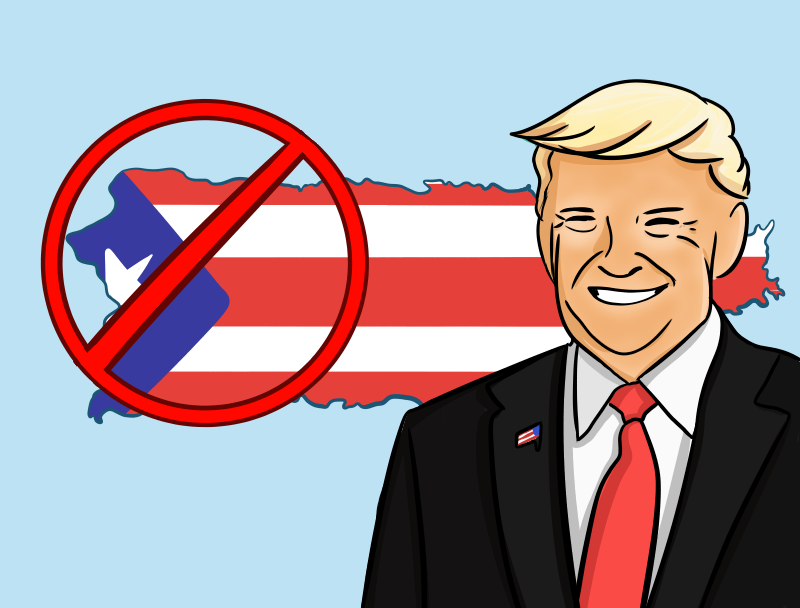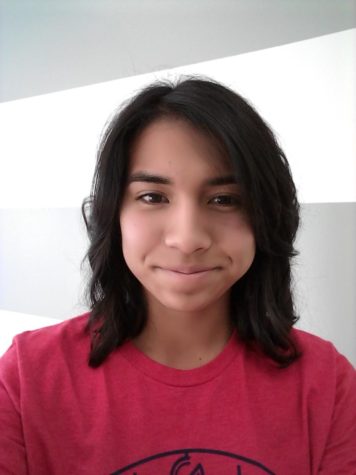Puerto Rico Needs to Be a State
Picture by SIerra Gutierrez
October 15, 2018
Last week was the first anniversary of Hurricane Maria, a dangerous tropical storm that cost nearly 3,000 Puerto Rican lives. When criticized for not aiding Puerto Rico, President Donald Trump dismissed the high death count, claiming that the number was “inflated by Democrats” to make him look bad. This reaction, along with other offenses that may indicate an attitude of disrespect and lack of concern for the people of Puerto Rico (who are American citizens) has, in turn, led to a slow and inadequate response that has left the island suffering even a year after the natural disaster. The Puerto Rican governor, Ricardo Rossello, blames the region’s troubles on its status as a U.S. territory instead of a state. While I fully support Governor Rossello and his allies as they call for statehood, a major roadblock to the final decision lies in the fact that not all of Puerto Rico is calling for statehood in unison.
Let’s start with some context about where Puerto Ricans actually stand in comparison to residents of recognized U.S. states. To put it simply, Puerto Ricans, who are, again, American citizens, do not enjoy all the same rights and privileges as those on the mainland. American citizens in PR were neither able to vote in the last presidential election nor any other federal election ever since the island became American property. In addition, Puerto Ricans have no voting member of Congress to represent their people in decisions of national importance. They do, however, pay taxes to the U.S. government.
Taxation without representation… sound familiar?
Also, although Puerto Rico does receive some support from the U.S., the territory’s Medicaid finance is capped at $321 million dollars per fiscal year – an amount that is easily exhausted by an area facing high levels of poverty and several health disasters including the Zika virus in 2015 and the aforementioned hurricane. In comparison, there is no cap for Medicaid finance in the mainland. These and other slights, along with the dangerous tendency of American people and politicians alike to relegate the island to an afterthought (if it even crosses their minds at all), have demonstrated that statehood is a necessary step for Puerto Rico if it is to receive the aid it deserves. The reason they haven’t already been admitted as a state, however, isn’t malicious neglect by Congress. No, it’s the Puerto Rican people themselves who stand in the way of statehood.
To us on the mainland, the perks of being a state are clear. Some Puerto Ricans, however, aren’t too keen on joining the Union. For instance, one privilege that many people in Puerto Rico enjoy is the lack of Federal Income tax that must be paid with money made on the island. It’s a small comfort in the face of the aforementioned issues, but one that Puerto Rican businessman and other independent groups enjoy. Secondly, since they are U.S citizens, Puerto Rico receives the full protection of the American armed forces as well as some limited access to Medicare and other support programs. In its current state, then, Puerto Rico maintains significant political autonomy when it comes to internal matters, and is allowed to cultivate its distinct cultural identity in addition to receiving some benefits from the federal government. Granted, the benefits aren’t nearly as good as the ones received by official states and a strong cultural identity won’t give people food and housing, but the compromise appears good enough for quite a few Puerto Ricans to be content with the island’s status as a territory.
It may come as a shock that even a few Puerto Ricans are satisfied with a system that many on the mainland consider outdated or even oppressive, but a number of polls and referendums held over the years show that the island is much more deeply divided on the issue than expected. 2017’s statehood referendum, for instance, appeared to show that Puerto Ricans were overwhelmingly in support of statehood. Apparently, 97% of Puerto Ricans voted to become an American state. The problem lies, however, in the fact that only 23% of the population showed up to vote- and, in a place where voter turnout hovers at about 80%, it’s hard to say that the referendum is truly representative of the Puerto Rican people. Due to a number of factors including misleading wording that resulted in a boycott of the vote by the Anti-statehood party and the fact that the vote was held on Sunday, when much of the majority-Catholic population would be at church, Congress rightfully decided to ignore the results of the referendum – much to the chagrin of Governor Rossello. Another referendum held in 2012 under the Obama administration similarly failed to produce a decisive answer from the Puerto Rican people because, out of the 54% of voters who wanted to change Puerto Rico’s status, only 63% voted to become a state – that works out to be about 33% of the total number of voters saying they were in favor of statehood. These results, taken into consideration by Congress, showed no clear indication that Puerto Rico had any desire to become a state, and was thus discarded as the status quo remained unchanged.
Puerto Rico should definitely become the country’s 51st state in order to protect the rights of Puerto Ricans as American citizens, but Congress cannot be blamed for allowing the island to continue on as a territory as long as it has. Even as Governor Rossello continues to make increasingly aggressive pushes for statehood, it is important to keep in mind that not all of Puerto Rico is in favor of this path. The decision to become a state with all the benefits and drawbacks associated with statehood lies squarely on the shoulders of the Puerto Rican people. In other words, if Puerto Ricans truly want statehood, they need come out and ask for it, and they should do so soon.


